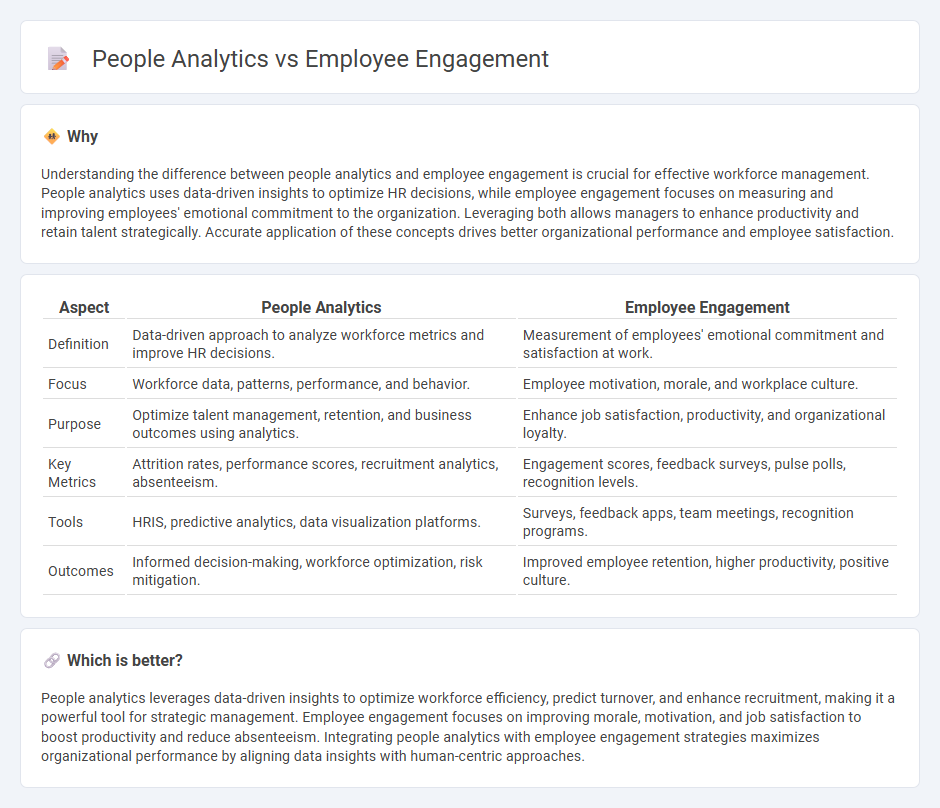
People analytics harnesses data-driven techniques to measure workforce performance and predict employee behavior, enabling strategic talent management. Employee engagement focuses on boosting motivation and satisfaction through personalized experiences and meaningful communication. Explore how integrating both approaches transforms organizational success.
Why it is important
Understanding the difference between people analytics and employee engagement is crucial for effective workforce management. People analytics uses data-driven insights to optimize HR decisions, while employee engagement focuses on measuring and improving employees' emotional commitment to the organization. Leveraging both allows managers to enhance productivity and retain talent strategically. Accurate application of these concepts drives better organizational performance and employee satisfaction.
Comparison Table
| Aspect | People Analytics | Employee Engagement |
|---|---|---|
| Definition | Data-driven approach to analyze workforce metrics and improve HR decisions. | Measurement of employees' emotional commitment and satisfaction at work. |
| Focus | Workforce data, patterns, performance, and behavior. | Employee motivation, morale, and workplace culture. |
| Purpose | Optimize talent management, retention, and business outcomes using analytics. | Enhance job satisfaction, productivity, and organizational loyalty. |
| Key Metrics | Attrition rates, performance scores, recruitment analytics, absenteeism. | Engagement scores, feedback surveys, pulse polls, recognition levels. |
| Tools | HRIS, predictive analytics, data visualization platforms. | Surveys, feedback apps, team meetings, recognition programs. |
| Outcomes | Informed decision-making, workforce optimization, risk mitigation. | Improved employee retention, higher productivity, positive culture. |
Which is better?
People analytics leverages data-driven insights to optimize workforce efficiency, predict turnover, and enhance recruitment, making it a powerful tool for strategic management. Employee engagement focuses on improving morale, motivation, and job satisfaction to boost productivity and reduce absenteeism. Integrating people analytics with employee engagement strategies maximizes organizational performance by aligning data insights with human-centric approaches.
Connection
People analytics leverages data science to analyze employee behaviors and sentiment, directly influencing strategies to boost employee engagement. By measuring key metrics such as job satisfaction, productivity, and turnover rates, organizations can tailor interventions that enhance workforce motivation and retention. This data-driven approach enables management to create a more engaged and high-performing organizational culture.
Key Terms
Motivation
Employee engagement measures the emotional commitment and motivation levels of employees, driving productivity and retention. People analytics leverages data to uncover patterns and insights that enhance motivation through personalized strategies. Explore how integrating people analytics with engagement initiatives can boost motivation across your workforce.
Retention
Employee engagement directly influences retention by fostering a motivated, satisfied workforce that reduces turnover rates. People analytics leverages data to identify patterns and predict which employees are at risk of leaving, enabling targeted interventions. Explore our insights to learn how combining engagement strategies with analytics enhances employee retention effectively.
Data-driven decision-making
Employee engagement measures workforce motivation and satisfaction, while people analytics leverages data to optimize HR strategies and predict talent trends. Data-driven decision-making enhances organizational performance by integrating employee sentiment insights with quantitative workforce metrics. Explore how combining employee engagement with people analytics can transform your business outcomes.
Source and External Links
Why employee engagement is key to company success - Firstup - Employee engagement drives long-term retention, higher performance, and organizational success by fostering personalized communication, recognition, and a sense of belonging, significantly boosting productivity and reducing absenteeism.
How to Improve Employee Engagement in the Workplace - Gallup.com - Engaged employees increase productivity, profitability, well-being, and reduce absenteeism and turnover, making engagement a key strategy for stronger business outcomes across industries.
What is Employee Engagement? (And How to Boost It) - Employee engagement involves employees feeling valued and connected, leading to higher productivity, lower absenteeism, better health, and stronger trust in leadership, which all contribute to a thriving workplace and organizational success.
 dowidth.com
dowidth.com